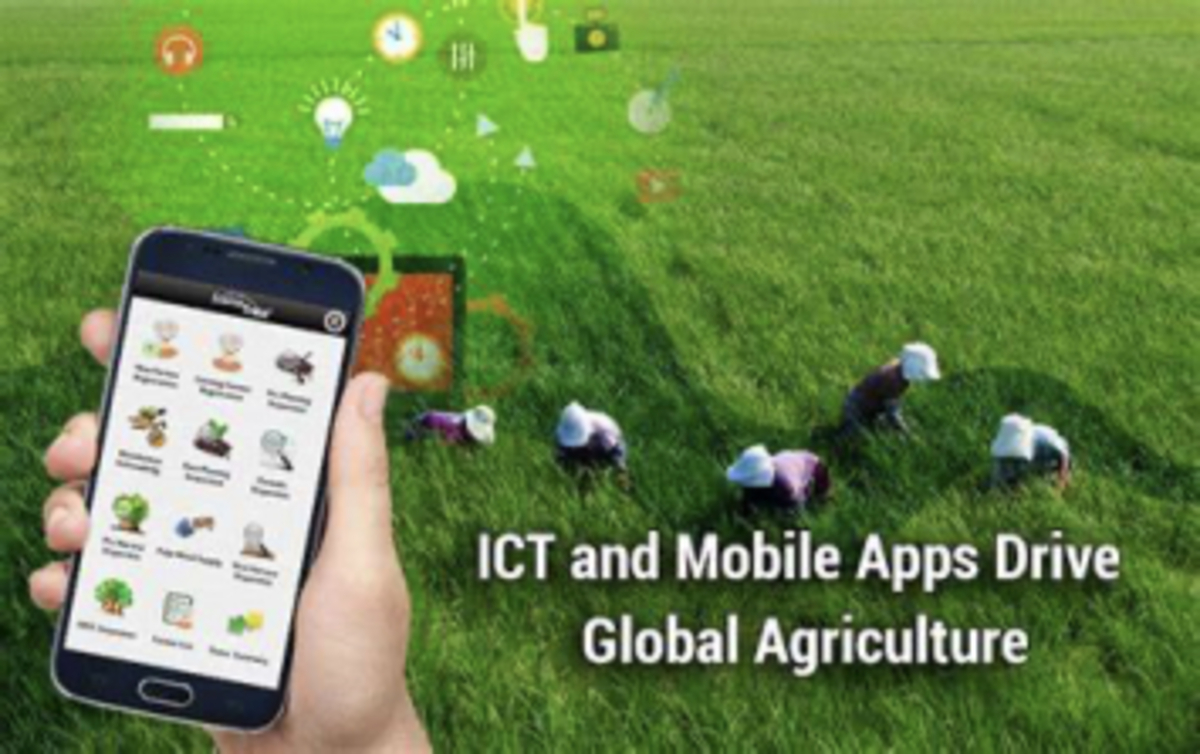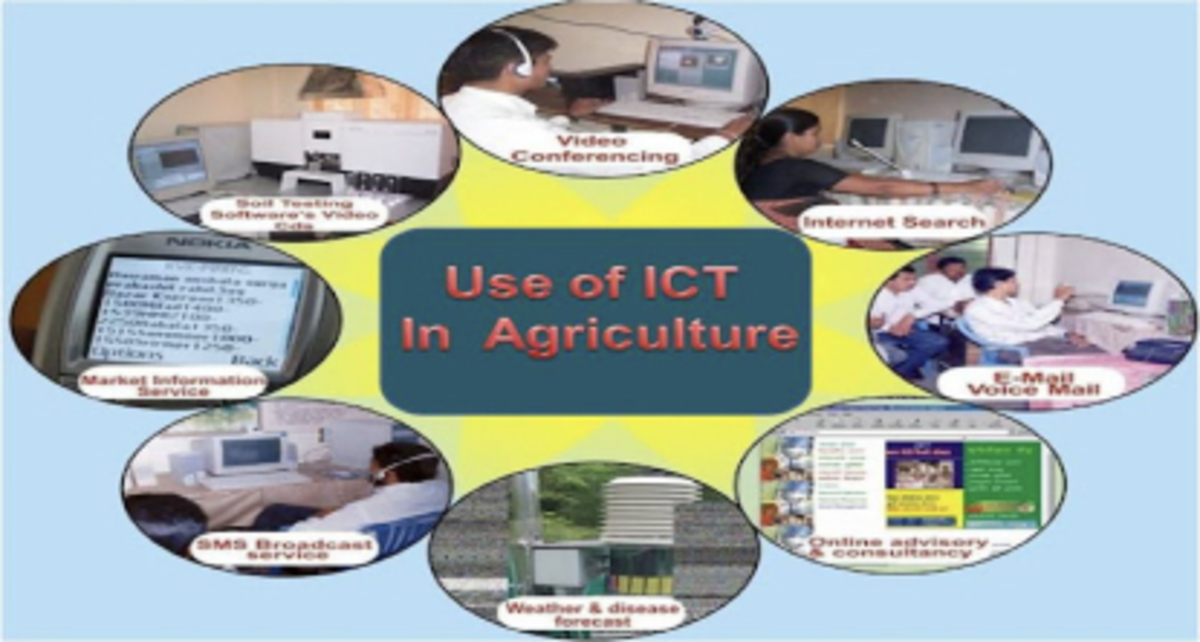ICT APPLICATION IN MODERN AGRICULTURAL TECHNOLOGY
ICT has the potential to transform the Indian agricultural sector, bringing benefits to all farmers, particularly small landowners. Agriculture employs the majority of rural people in developing countries, making it the most vital sector. In terms of yield, marketing, and profit, traditional agricultural practices face a number of obstacles. The use of Information and Communication Technologies (ICT), play a crucial role in improving the livelihoods of rural small landholder farmers, significantly mitigates traditional agriculture's challenges (Singh et al., 2017). ICT contributes to the growing demand for new methods of doing things. It also helps to empower rural people by increasing access to natural resources, agricultural technologies, effective production strategies, markets, banking and financial services, and so on.
September 1st 2022, 5:37:41 pm | 5 min read
Share On Social Media
ICT APPLICATION IN MODERN AGRICULTURAL TECHNOLOGY

INTRODUCTION
ICT has the potential to transform the Indian agricultural sector, bringing benefits to all farmers, particularly small landowners. Agriculture employs the majority of rural people in developing countries, making it the most vital sector. In terms of yield, marketing, and profit, traditional agricultural practices face a number of obstacles. The use of Information and Communication Technologies (ICT), play a crucial role in improving the livelihoods of rural small landholder farmers, significantly mitigates traditional agriculture's challenges (Singh et al., 2017). ICT contributes to the growing demand for new methods of doing things. It also helps to empower rural people by increasing access to natural resources, agricultural technologies, effective production strategies, markets, banking and financial services, and so on.
Use of ICT in Agriculture
Improving small-holder livelihoods requires an understanding of and response to global agriculture developments, both positive and negative, in which ICT can play a key role.
Increasing globalisation and integration of food markets has increased competition and efficacy in the agriculture sector, as well as providing unique chances to engage more small farmers in supply chains.
Agriculture has a number of modern and serious difficulties, particularly in developing nations that are subject to price shocks, climate change, and rural infrastructure shortages.
Increasing efficiency, productivity and sustainability of small scale farms.

Pest and disease control information, particularly early warning systems, new varieties, innovative approaches to maximise production, and quality control regulations
Markets that is better because of informed decisions regarding future crops and commodities, as well as the optimum time and place to sell and buy items.
Current market information on commodity pricing, input costs, and consumer trends
Build their constituency's capacity and representation when negotiating input and output prices, land claims, resource rights, and infrastructure projects.
Reduce social isolation, widen the perspective of local communities in terms of national or global developments, open up new business opportunities and allow easier contact with friends and relatives.
ICT Initiatives for Agriculture in India
The AGRISNET serves farming community by disseminating information and providing services through use of Information & Communication Technology (ICT). It has following goals-
Providing information to the farmers on quality of the inputs and its availability.
Disseminating information of various government schemes and recommending fertilizers after soil testing. Providing information on latest technologies for increasing productivity in agriculture.
Digital Mandi
Digital Mandi is an electronic trading platform for facilitating farmers and traders to sell and procure agricultural produce beyond the geographical and temporal limitations effortlessly. Various financial institutions also participate in online trading of agricultural output to remove cash crisis.
Akash Ganga
This project began in 1996 in Gujarat and Maharashtra. Milk collection, fat testing, and payment are all made more efficient and user-friendly thanks to this ICT effort. It increases dairy producers' income by incorporating innovative technology, which is known as an integrated solution for Automatic Milk Collection System.
AGMARKNET
The Ministry of Agriculture, Government of India, launched the Agricultural Marketing Information Network (AGMARKNET) in March 2000 to help farmers make better decisions about marketing their produce. This portal was created to help speed up the agricultural marketing system by providing clear and timely information to producers, consumers, traders, and policymakers regarding the influx of agricultural commodities in the market and their prices.
AgroNxt
AgroNxt is a multitasking platform for farmers that provides inputs, agriculture advise, weather forecasts, and other services. AgroNxt focuses on contributing to the agriculture industry by providing farmers with useful, trustworthy, and timely information that helps them enhance farm profitability. It aids in maintaining agricultural output and long-term viability.
e-Chaupal: Farmer Friendly Networking Technology
In June 2000, Indian Tobacco Company (ITC) started a novel web-based effort in the Hoshangabad area of Madhya Pradesh. The goal was to use the Internet to connect directly with rural farmers in order to purchase agricultural and aquaculture products such as soybeans, wheat, coffee, and prawns. In rural India, the programme instals computers with Internet access to provide farmers with up-to-date marketing and agricultural information. Farmers can directly negotiate the sale of their produce with ITC Limited thanks to laptops and Internet connectivity offered by ITC Limited in rural communities across numerous agricultural regions of the country. Farmers can use the internet to get information on mandi prices and best farming practises, as well as place orders for agricultural inputs such as seeds and fertilisers.
A-Aqua
It was initiated in 2003 in Pune, Maharashtra. A-Aqua is a multilingual online system that facilitates farmers by advising them, solving their problems and answering their questions related to agriculture. Farmers have to register on A-Aqua platform online or telephonically. After that, they can post their queries on the portal, for which they get answers shortly. Thus A-Aqua empowers the members in a community to create their own content and provides an easy to use interface.
e-Krishi
Implemented by Kerala State IT Mission, the e-Krishi project aims at facilitating and enabling farmers and other stakeholders through IT enabled Agri-Business Centres to interact with agricultural service providers in the private, government and non-government sectors. Besides providing agricultural information and advice to farmers, the initiative is also a means of making many other services available including marketing agricultural products-both selling and buying, access to warehouses, access to schemes and subsidies, grading of agricultural produce, access to micro credit, soil testing and so on. The present project is unique in that it helps the farmers to get better price for the product and better exposure.
e-Sagu
The e-Sagu system was created in 2004 in Andhra Pradesh. Sagu translates to "cultivation." E-Sagu provides farmers with personalised solutions to their challenges as well as advice from sowing to harvesting. Farmers sent digital images and videos of their farm conditions, which were reviewed by agricultural scientists and specialists. After that, they advise the farmers on what they should do. This benefit extends to small and marginal farmers as well. The expert advice is delivered to the concerned farmer in a timely manner. Illiterate farmers' questions are answered at the local level by educated coordinators. The farm situation or problem is communicated to the agricultural experts and they transmit accurate information to the farmers.
Fisher Friend Mobile Advisory KCC
The Fisher Friend Programme (FFP) of MS Swaminathan Research Foundation was launched in 2009 to protect fisher folk from occupational hazards and to empower their livelihoods. The relevant information on wave height, wind speed and director, potential fishing zones, relevant news, government schemes and market price is provided to fishermen in local language. The FFP covers marginalized coastal communities in Tamil Nadu, Puducherry, Andhra Pradesh, Kerala, and Odisha, and is operational in English, Tamil, Telugu, Malayalam, Odia languages.
Gyandoot-Messenger of Informant
This project was launched on 1st January 2000 in a small district called Dhar in Madhya Pradesh in India with the installation of a low cost rural intranet covering twenty village information kiosks in five blocks of the district. The Kiosks offered services like Agriculture produce auction centre rates, Copies of land records, online registration of application etc.
IKSL
IFFCO KISAN SANCHAR LTD (IFFCO Kisan) was started in 2012. It delivers relevant information and custom-made solutions to the concerned farmers through voice messages on mobile phones. The farmers can also communicate directly to the agricultural experts on explicit themes via ‘phone-in’ programmes.
Kissan
The Kerala Government’s unique ICT-based Karshaka Information Systems Services and Networking is known as KISAN. Project Kissan is one of the leading citizen-centric e-governance projects of the Kerala government’s Department of Agriculture. It is an integrated, multi-modal delivery of agricultural information system providing several dynamic and useful information and advisory services for the farming community across Kerala. “The basic objective of Project Kissan is to provide the right information to the right persons at the right time in the right places and in the right context, dynamically using a combination of advanced technology like web technology, on line agri video channels, television-based mass media programs, telephone-based advisory, mobile SMS-based advisory and broadcast service,” said Rathan Kelkar. The entire project is managed by a team of professionals from the agriculture, IT and agri-journalism segments.
Kisan Call Centers (KCCs)
The Department of Agricultural and Co-operation launched KCCs on January 21, 2004, with the goal of providing extension services to the farming community in the local languages. Farmers' questions are answered by agricultural graduates on a toll-free support line at 1800-180-1551 in their native language. Agricultural scientists also go out into the field to obtain a sense of complex agricultural challenges and how to tackle them. The farmers' questions are answered in 22 different languages. At each KCC site, call centre services are provided from 6 a.m. to 10 p.m. every day of the week. Kisan Call Centre agents known as Farm Tele Advisor (FTAs), are graduates or above (i.e. PG or Doctorate) in Agriculture or allied (Horticulture, Animal Husbandry, Fisheries, Poultry, Bee-keeping, Sericulture, Aquaculture, Agricultural Engineering, Agricultural Marketing, Bio-technology, Home Science etc. and possess excellent communication skills in respective local language. Queries which cannot be answered by Farm Tele Advisor (FTAs) are transferred to higher level experts in a call conferencing mode. These experts are subject matter specialists of State Agriculture Departments, ICAR and State Agricultural Universities.
Mahindra Kisan Mitra
Farmers can get information on commodity prices, weather forecasts, crop warnings, financing, insurance, cold storage, and warehouses, as well as success stories from progressive farmers, through this portal.
Touch Screen Kiosk
Touch Screen Kiosk was first tried on dissemination of animal health knowledge for development of landless dairy cattle owners in the peri-urban regions of Pondicherry, India (2002-2004). The cattle owners bring their animals to the veterinary dispensary for treatment or Artificial Insemination (AI) and register the case and will wait for their turn. The waiting time is utilized for getting information from the kiosk.
Conclusion
Agriculture is one of our country's most important industries. ICT has the potential to alter agriculture in a variety of ways. In agricultural information transmission and other fields, ICT programs have yet to make a breakthrough. The importance of ICT deployment should be emphasized even more. ICT for agricultural projects must be thoroughly contrasted and analyzed. It is imperative that appropriate information be obtained through ICTs and that sophisticated ICTs be deployed in agriculture. Following a survey and analysis of current ICT-based information service models, the following recommendations for future development and research can be made to government organizations and ICT developers: Evaluation of the effectiveness of existing strategies and policies to run ICT projects in agriculture based on the feedback of grass root level workers/officers working directly with farmers in rural regions.
To boost social and economic benefits, the agriculture sector is being transformed into modern digital agriculture, increasing farmers' digital access through technology advancements and skill development. Adopting advanced ICT tools in agriculture, such as GPS, GIS, RFID, Remote sensing, and Smart devices, for precision agriculture, sustainability, the environment, and food safety, among other things.
Referrence
1 . Singh, S., Ahlawat, S., Sanwal, S., 2017. Role of ICT in Agriculture: Policy Implications. Orient. J. Comp. Sci. and Technol;10(3).
2 . Food and Agriculture Organisation of the United Nation.
3 . Mahant, M., Shukla, A., Dixit, S., Pate, D. 2012. Uses of ICT in Agriculture. International Journal of Advanced Computer Research. 2277-7970.
About the Authors
Supriya*, Aditya Bhooshan Srivastava
Acharya Narendra Deva University of Agriculture and Technology, Kumarganj, Ayodhya (U.P.)-224229
*Corresponding author: supriyaanand55@gmail.com
